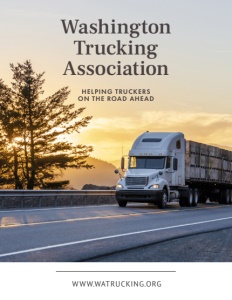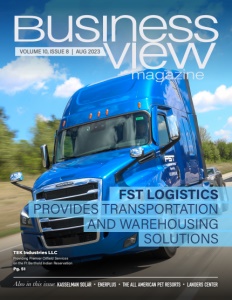Washington Trucking Association
helping truckers on the road ahead
Serving as the voice of truckers in Washington State, the Washington Trucking Association steers the right course for its valued members
Celebrating an important milestone, the Washington State Trucking Association is proud to mark 101 years of existence. Since 1922, this leading association has been the voice of truckers in Washington State. We recently caught up with Sheri Call, the WTA’s president and chief executive officer, and she told us more about the organization and how it helps those who keep America rolling forward.
Call explains that the purpose of her organization is to advocate on behalf of the trucking industry. It is composed of more than 600 member trucking companies, representing the gamut from the Fortune 100 world of big-business movers and shakers down to small mom-and-pop operations.
“We are also fortunate to have folks on staff who mainly contribute to educating the industry,” she adds, citing compliance education where it is federally regulated. “There is a non-stop effort to continue to keep carrier members educated about upcoming legislation or existing rule-making or things that are going to have an impact upon their industry that they want to get ahead of.
Call continues that the WTA works to create positive legislation for the trucking industry—matters that affect the interests of both the industry and the public good.
“I don’t think our focus has changed much in a hundred years,” she says of meeting the continuing and evolving needs of the trucking industry. “We’re faced with new challenges.”
Call cites an ongoing revolution in power and technology for trucking, as well as the economic spin-offs from the recent COVID pandemic.
“There’s been a lot of just topsy-turvy conditions for the industry from the onslaught of COVID,” she says. “We saw surges in e-commerce and the demand for groceries and medical supplies, and eventually our industry was responsible for hauling and distributing vaccines all across North America, so it’s been a real-time for the industry to shine.”
“The downside of all that is the general public awareness of supply-chain issues and the impact that can have when you have capacity challenges and manufacturing challenges or whatever it might be.”
 Driving change
Driving change
The shipping industry is still experiencing its ups and downs concerning the COVID problem, especially as it affects ocean-going freight, as Call points out. Retailers have opted to cut back on inventories, thus translating to a big slowdown in imports. The current levels of runaway inflation and lessened consumer demand are also important factors, as Call notes.
“We’re feeling that,” she adds, “especially in some segments of the industry.”
There have been aspects both pro and contra, regarding the restrictions stemming from the pandemic, as Call acknowledges. One of the latter is the shortage of truckers these days. She cites the American Trucking Research Institute (or ATRI) and a survey of trucking-related issues it recently conducted.
The driver shortage has been an ongoing problem for several years now, and it affects carriers of all types. Carriers have said they could increase capacity and do more business—if only they could recruit and retain well-qualified, good drivers.
As Call notes, the driver shortage may have begun before the pandemic. It’s just that the pandemic heightened public awareness (especially in the eyes of lawmaking bodies) and sharpened the need to maintain those all-important supply chains. Contributors to the shortage include an aging, retiring workforce and an inability to replace them with new drivers, including young drivers and women drivers.
Yet now that may at last be turning around, as Call points out.
In Washington State, thanks to its legislature, a provision of some $2.5 million was put into last year’s state budget to cover driver training programs for those pursuing a commercial driver’s license (or CDL). This tuition grant was the first of its kind dedicated to CDL training for operators of trucks and buses.
This has translated to an increased capacity for training and driver availability, and it has also meant pulling vital programs out of mothball status and making them available to people hitherto unlikely to seek this training in rural areas of Washington State, as Call informs, including at the level of high school electives.
“This has been a big plus for us,” she adds.
Further, Washington’s state legislature recognizes the need for truckers in keeping America’s supply chains running smoothly. To this end, as Call points out, the lawmakers have also committed another $6 million to fund the CDL tuition grant training program over the next two years.
“So we’re excited about that,” she continues.
Returning to the topic of women in the trucking industry, Call says the WTA is working to get more of them into the field and make for a more inclusive workplace; one that is welcoming for all types of individuals.
“I have never experienced any sort of discrimination myself, being the head of an organization for an industry that has typically been dominated by males,” she reveals. “I can honestly say that I’m probably a great spokesperson for women who are considering getting into the industry. It is not meant to be an exclusive industry, but it is perceived that way.”
As an example of the progressive thinking at the WTA, Call cites a potential grant for child care for women truckers who are also mothers, thus allowing them access to training and more.
Elsewhere, the WTA has been lobbying entities at both the state and federal levels for an increase in truck parking. What Call is hearing, she reports, is that the side of the road is just not acceptable, and parking there, as many truckers must, can be problematic and even dangerous.
In addition, the WTA has received unanimous bipartisan support in the Washington State Legislature for measures that would increase restroom access for truckers. Too often, perhaps for trumped-up security concerns, truckers on the road and making deliveries have been denied such access, as Call reveals.
“We’re just asking for basic human accommodation to allow drivers to use the restroom,” she says.

Ongoing training and trends
This year, the WTA kicked off an initiative to hold informal dialogue meetings, coordinated via the Internet, with the personnel of the Washington State Highway Patrol. Both state and federal agencies, such as those representing labor and industries, are also invited to the talks, which center around such important topics as safety issues and vehicle inspections.
“It is meant to be a community-based collaboration,” says Call, adding that members of the American Trucking Associations Safety Management Council also take part in these meetings.
Workshops about compliance education and professional development are also offered. Call says this is a big boon to the smaller carriers that make up some 90 percent of the trucking industry.
“We can be a resource for those folks,” she adds.
Also, the WTA has created a maintenance and technology council that operates along similar educational guidelines. This effort is led by retired trucker John Lightner.
The WTA’s activities extend the whole year around, Call informs. One example is the annual truck-driving championship held in April. The competition is all about truckers’ practical, mental, and driving skills.
“It’s a very popular and very inspiring event,” Call observes. “The winners of that contest go on to compete nationally.”
This is, she adds, a very big deal in the trucking industry, with countless companies investing many millions of dollars to get their drivers trained and ready to compete.
At the national level, the Washington Trucking Association is affiliated with the American Trucking Association (or ATA). This grouping is the largest and most comprehensive national trade association for the trucking industry. The WTA relies heavily upon the ATA, says Call, especially concerning federal issues and things that trickle down to the state level.
“I couldn’t do my job without my reliance upon our state and federal partners,” she adds, stressing the extreme importance of proper cohesion and the collaborative efforts that make the trucking industry a big success for everyone.
A portion of these collective efforts have been geared towards electric cars.
Will electric trucks be the next big thing for the trucking industry? In a word, says Call, no.
“There are also alternatives to that,” she adds, citing the potential replacement of Diesel fuel with hydrogen, as the latter has a longer range.
Call points out, costs and infrastructural problems make hydrogen use prohibitive, at least for now. Washington State has a zero-emissions goal for 2050, she adds, and most WTA members see that as feasible.
Artificial intelligence (or AI) and the concept of trucks that drive themselves are other potential future factors that the WTA is watching, says Call. Whatever the case, trucking’s future is bright, she adds.
“We’re working,” she emphasizes, “to make a better workplace,” she concludes.
AT A GLANCE
Washington Trucking Association
What: The leading association both educating and advocating for its trucking and logistic-based members
Where: Olympia, Washington
Website: www.watrucking.org



